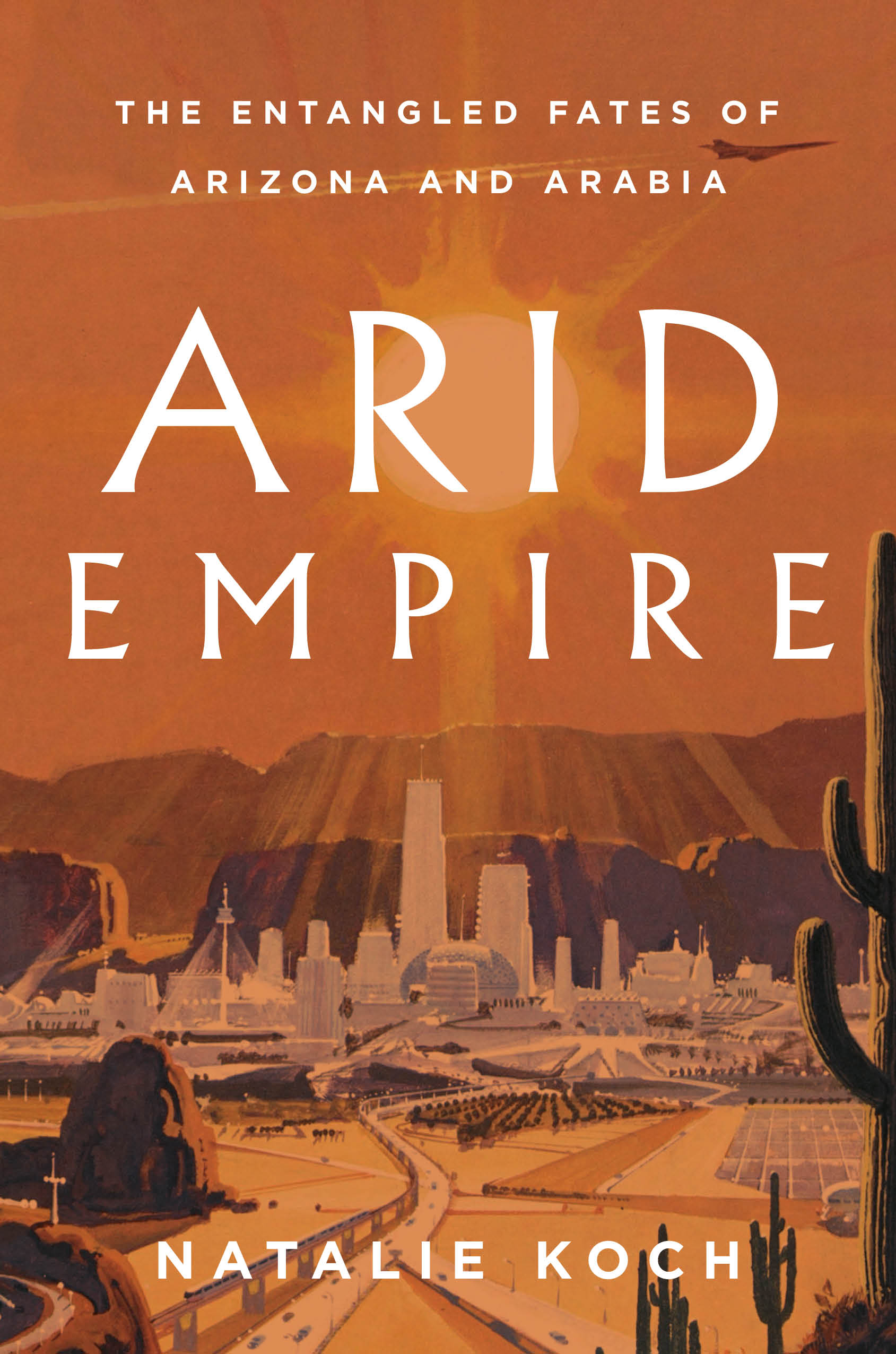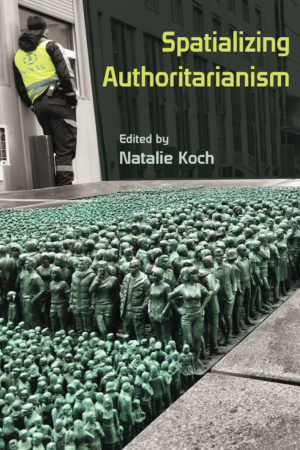Natalie Koch, PhD
I am a political geographer working on the topics of geopolitics, nationalism, energy and environmental politics, science and technology studies, and sports geography. Empirically, my research focuses on the Arabian Peninsula, where I study the many transnational ties that bind the Gulf countries, actors, and ideas to other parts of the world.
Books
Koch, N. 2022. Arid empire: The entangled fates of Arizona and Arabia. New York: Verso. [Amazon]
Koch, N. (ed.). 2022. Spatializing authoritarianism. Syracuse: Syracuse University Press. [Amazon]
Moisio, S., N. Koch, A. Jonas, C. Lizotte, J. Luukkonen (eds.). 2020. Handbook on the changing geographies of the state: New spaces of geopolitics. Northampton: Edward Elgar. [Amazon]
Koch, N. 2018. The geopolitics of spectacle: Space, synecdoche, and the new capitals of Asia. Ithaca: Cornell University Press. [Amazon]
Koch, N. (ed.). 2017. Critical geographies of sport: Space, power, and sport in global perspective. New York: Routledge. [Amazon]
Articles, book chapters, and commentaries
Koch, N. 2024. Sustainability spectacle in the Gulf. Current History 123(857): 330–335.
Koch, N. 2024. Scientific nationalism and museums of the future in Germany and the UAE. Political Geography 113: 103144. [Text]
Koch, N. 2024. Teaching geopolitics through sport. Journal of Geography in Higher Education 48(1): 31-36. [Text]
Koch, N. 2024. Seeking surprise in political geography. In A. Curley, R. Lee, M. Sollai, S.S. Hughes, B. Meché, M. Lane, and N. Koch, “Review forum: Reading Natalie Koch’s, Arid empire: The entangled fates of Arizona and Arabia.” Political Geography 111: 103010.[Text]
Koch, N. 2024. Authoritarian regimes and the environment. In N. Lindstaedt and J. Van den Bosch (eds.), Research handbook on authoritarianism. Northampton: Edward Elgar, 213-227.[Text]
Koch, N. 2023. The problem with rallying around the (Ukrainian) flag. Space and Polity 27(2): 252-256.[Text]
Koch, N. 2023. Geographies of nationalism. Human Geography 16(2): 200-211. [Text]
Koch, N. 2023. Revisiting “For ethnography in political geography.” Political Geography 102: 102837. [Text]
Koch, N. 2022. Guest essay: Arizona is in a race to the bottom of its water wells, with Saudi Arabia’s help (December 26). The New York Times. [Text]
Koch, N. 2022. Authoritarian space-time. Political Geography 95: 102628. [Text]
Koch, N. 2022. Planting flags in water. Dialogues in Human Geography 12(2): 302-306. [Text]
Koch, N. 2022. Wastelanding Arabia: America’s ‘Garden of Eden’ in Al Kharj, Saudi Arabia. Journal of Historical Geography 77: 13-24. [Text]
Koch, N. 2022. The political geography of economic nationalism. In A. Pickel (ed.), Handbook of economic nationalism. Northampton: Edward Elgar, 14-28. [Text]
Koch, N. 2022. Sports sponsorship and Gulf geopolitics. Orient 2022 (III): 6-11. [Text]
Koch, N. 2022. Sporting cities and economic diversification in the Arabian Peninsula. In P.M. Brannagan and D. Reiche (eds.), Routledge handbook of sport in the Middle East. New York: Routledge, 287-296. [Text]
Koch, N. 2022. Urban life in Central Asia. In D. Montgomery (ed.), Central Asia: Contexts for understanding. Pittsburgh: University of Pittsburgh Press, 196-213. [Text]
Koch, N. 2021. The desert as laboratory: Science, state-making, and empire in the drylands. Transactions of the Institute of British Geographers 46(2): 495-509. [Text]
Koch, N. 2021. Whose apocalypse? Biosphere 2 and the spectacle of settler science in the desert. Geoforum 124: 36-45. [Text]
Koch, N. 2021. Food as a weapon? The geopolitics of food and the Qatar-Gulf rift. Security Dialogue 52(2): 118-134. [Text]
Koch, N. 2021. The political lives of deserts. Annals of the American Association of Geographers 111(1): 87-104. [Text]
Koch, N. 2021. Desert geopolitics: Arizona, Arabia, and an arid lands response to the territorial trap. Comparative Studies of South Asia, Africa and the Middle East. 41(1): 88-105. [Text]
Koch, N. and V-P. Tynkkynen. 2021. The geopolitics of renewables in Kazakhstan and Russia. Geopolitics 26(2): 521-540. [Text]
Koch, N. and N. Vora. 2020. Islamophobia and the uneven legal geographies of ethnonationalism. Political Geography 83: 102187. [Text]
Koch, N. 2020. German pigs, and the autocrats who loved them. Los Angeles Review of Books.
Koch, N. 2020. The geopolitics of Gulf sport sponsorship. Sport, Ethics and Philosophy 14(3): 355-376. [Text]
Koch, N. 2020. InterAsian Islamisms: Monumental mosques and modernity in Kazakhstan and Qatar. In B. Batuman (ed.), Cities and Islamisms: On the politics and the production of built environment. New York: Routledge: 15-30. [Text]
Koch, N. 2020. Deep listening: Practicing intellectual humility in geographic fieldwork. The Geographical Review 110(1-2): 52-64. [Text]
Koch, N. 2020. The corporate production of nationalism. Antipode: A Radical Journal of Geography 52(1): 185-205. [Text]
Koch, N. 2020. Methodological nationalism. In A. Kobayashi (ed.), The international encyclopedia of human geography (2nd ed., Vol. 9). Oxford: Elsevier: 245-248. [Text]
Koch, N. 2019. Capitalizing on cosmopolitanism in the Gulf. Current History 118(812): 349-355. [Text]
Koch, N. and N. Vora. 2019. Laboratories of liberalism: American higher education in the Arabian Peninsula and the discursive production of authoritarianism. Minerva 57(4): 549-564. [Text]
Koch, N. and T. Perreault. 2019. Resource nationalism. Progress in Human Geography 43(4): 611-631. [Text]
Koch, N. 2019. Privilege on the Pearl: The politics of place and the 2016 UCI Road Cycling World Championships in Doha, Qatar. In N. Wise and J. Harris (eds.), Events, Places and Societies. New York: Routledge. [Text]
Koch, N. 2019. National Day celebrations in Doha and Abu Dhabi: Cars and semiotic landscapes in the Gulf. In A. Diener and J. Hagen (eds.), The city as power: Urban space, place, and national identity. Lanham: Rowman and Littlefield, 189-202. [Text]
Koch, N. 2018. The geopolitics of sport beyond soft power: Event ethnography and the 2016 Cycling World Championships in Qatar. Sport in Society 21(12): 2010-2031. [Text]
Koch, N. 2018. Sports and heritage in the UAE. LSE Middle East Centre Blog: December 15.
Koch, N. 2018. The geopolitics of renewables in Kazakhstan. GW Central Asia Program Memo #211. [Text]
Koch, N. 2018. Gulf nationalism and invented traditions. LSE Middle East Centre Blog: August 3.
Koch, N. 2018. Sports and the city. Geography Compass 12(3): 12:e12360. [Text]
Koch, N. 2018. Green laboratories: University campuses as sustainability ‘exemplars’ in the Arabian Peninsula. Society & Natural Resources 31(5): 525-540. [Text]
Koch, N. 2018. Disorder over the border: Spinning the spectre of instability through time and space in Central Asia. Central Asian Survey 37(1): 13-30. [Text]
Koch, N., A. Valiyev, H. Khairul. 2018. Mosques as monuments: An inter-Asian perspective on monumentality and religious landscapes. cultural geographies 25(1): 183-199. [Text]
Koch, N. 2018. Trump, one year later: Three myths of liberalism exposed. In “Reassessing the Trump presidency, one year on” (with P. Steinberg, S. Page, J. Dittmer, B. Gökariksel, S. Smith, A. Ingram). Political Geography 62: 207-215. [Text]
Koch, N. 2017. Geopower and Geopolitics in, of, and for the Middle East. International Journal of Middle East Studies 49(2): 315-318. [Text]
Koch, N. 2017. Orientalizing authoritarianism: Narrating US exceptionalism in popular reactions to the Trump election and presidency. Political Geography 58: 145-147. [Text]
Koch, N. 2016. We entrepreneurial academics: Governing globalized higher education in ‘illiberal’ states. Territory, Politics, Governance 4(4): 438-452. [Text]
Koch, N and A. Paasi. 2016. Banal Nationalism 20 years on: Re-thinking, re-formulating, and re-contextualizing the concept. Political Geography 54: 1-6. [Text]
Koch, N. 2016. Is nationalism just for nationals? Civic nationalism for non-citizens and celebrating National Day in Qatar and the UAE. Political Geography 54: 43-53. [Text]
Koch, N. 2016. Is a ‘critical’ area studies possible? Environment and Planning D 34(5): 807-814. [Text]
Koch, N. and K. White. 2016. Cowboys, gangsters, and rural bumpkins: Constructing the ‘other’ in Kazakhstan’s ‘Texas.’ In M. Laruelle (Ed.), Kazakhstan in the Making: Legitimacy, Symbols, and Social Changes. Lanham: Lexington, 181-207. [Text]
Koch, N. 2016. The ‘personality cult’ problematic: Personalism and mosques memorializing the “father of the nation” in Turkmenistan and the UAE. Central Asian Affairs 3(4): 330-359. [Text] [Talk on YouTube]
Koch, N. and A. Valiyev 2016. Restructuring extractive economies in the Caspian basin: Too little, too late? PONARS Eurasia. Policy memo #441. [reprinted on RBK as “Реформы и их имитация: куда движутся экономики прикаспийских стран”]
Koch, N. and A. Valiyev. 2015. The Sochi syndrome afoot in Central Asia: Spectacle and speculative building in Baku, Astana, and Ashgabat. PONARS Eurasia. Policy memo #371. [reprinted on openDemocracy as “The Sochi Syndrome”]
Koch, N. and A. Valiyev. 2015. Urban boosterism in closed contexts: Spectacular urbanization and second-tier mega-events in three Caspian capitals. Eurasian Geography and Economics 56(5): 575-598. [Text]
Koch, N. 2015. Gulf nationalism and the geopolitics of constructing falconry as a ‘heritage sport.’ Studies in Ethnicity and Nationalism 15(3): 522–539. [Text]
Vora, N. and N. Koch. 2015. Everyday inclusions: Rethinking ethnocracy, kafala, and belonging in the Arabian Peninsula. Studies in Ethnicity and Nationalism 15(3): 540–552. [Text]
Koch, N. 2015. Exploring divergences in cross-regional comparative research: The spectacular cities of Central Asia and the GCC. Area 47(4): 436-442. [Text]
Koch, N. 2015. ‘Spatial socialization’: Understanding the state effect geographically. Nordia Geographical Publications 44(4): 29-35. [Text]
Koch, N. 2015. The violence of spectacle: Statist schemes to green the desert and constructing Astana and Ashgabat as urban oases. Social and Cultural Geography 16(6): 675-697. [Text]
Koch, N. 2015. Domesticating elite education: Raising patriots and educating Kazakhstan’s future. In M. Ayoob and M. Ismayilov (Eds.) Identity and foreign policy in Central Asia and the Caucasus. New York: Routledge: 82-100. [Text]
Koch, N. 2014. ‘Building glass refrigerators in the desert’: Discourses of urban sustainability and nation-building in Qatar. Urban Geography 35(8): 1118-1139. [Text]
Koch, N. 2014. The shifting geopolitics of higher education: Inter/nationalizing elite universities in Kazakhstan, Saudi Arabia, and beyond. Geoforum 56: 46-54. [Text]
Koch, N. 2014. Bordering on the modern: Power, practice, and exclusion in Astana. Transactions of the Institute of British Geographers 39(3): 432-443. [Text]
Koch, N. 2014. The Birth of Territory: Should Political Geographers Do Conceptual History? Dialogues in Human Geography 4(3): 348-351. [Text]
Koch, N. 2014. Grounding Central Asian geopolitics. Geopolitics 19: 227–233. [Text]
Mamadouh, V., E. dell’Agnese, T. Yamazaki, C. Flint, N. Koch, L. Muscarà, and J. Agnew. 2014. Reading John Agnew and Luca Muscarà’s Making Political Geography. Political Geography 38: 46-56. [Text]
Koch, N. 2013. Technologizing complacency: Spectacle, structural violence, and ‘living normally’ in a resource-rich state. Political Geography 37: A1-A2. [Text]
Koch, N. 2013. Introduction – Field methods in ‘closed contexts’ : Undertaking research in authoritarian states and places. Area 45(4): 390-395. [Text]
Koch, N. 2013. Technologising the opinion: Focus groups, coercion, and performance. Area 45(4): 411-418. [Text]
Koch, N. 2013. The ‘heart’ of Eurasia? Kazakhstan’s centrally-located capital city. Central Asian Survey 32(2): 134-147. [Text]
Koch, N. 2013. Sport and soft authoritarian nation-building. Political Geography 32 (2013): 42-51. [Text]
Koch, N. 2013. Why not a world city? Astana, Ankara, and geopolitical scripts in urban networks. Urban Geography 34(1): 109-130. [Text]
Koch, N. 2012. Urban ‘utopias’: The Disney stigma and discourses of ‘false modernity.’ Environment and Planning A 44(10): 2245-2462. [Text]
Koch, N. 2011. Security and gendered national identity in Uzbekistan. Gender, Place, and Culture: A Journal of Feminist Geography 18(4): 499-518. [Text]
Koch, N. 2010. The monumental and the miniature: Imagining ‘modernity’ in Astana. Social and Cultural Geography 11(8): 769-787. [Text]
Bond, A. and N. Koch. 2010. Interethnic tensions in Kyrgyzstan: A political geographic perspective. Eurasian Geography and Economics 51(4): 531–562. [Text]

